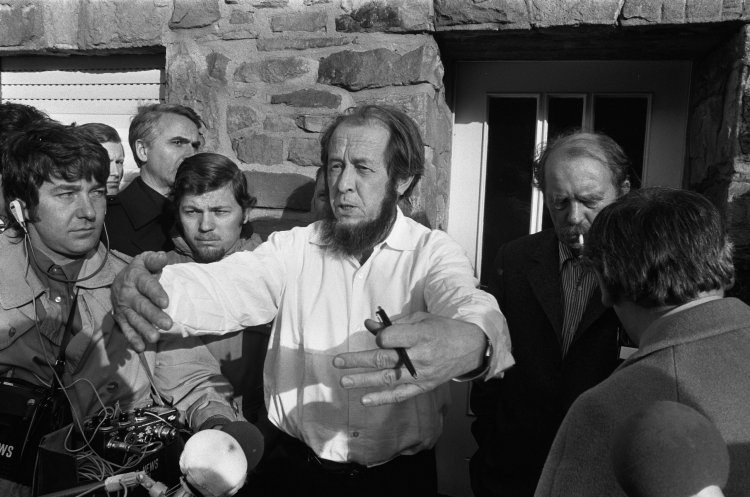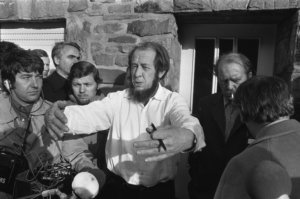Solzhenitsyn on NATO, Ukraine, & Putin
Above: Solzhenitsyn with Heinrich Böll in Langenbroich, West Germany, 1974. Editor’s note: OnePeterFive welcomes submissions with various perspectives on the Ukraine Crisis and Fatima. These views may not reflect the opinions of the editorial board. Men will not accept truth […]


Above: Solzhenitsyn with Heinrich Böll in Langenbroich, West Germany, 1974.
Editor’s note: OnePeterFive welcomes submissions with various perspectives on the Ukraine Crisis and Fatima. These views may not reflect the opinions of the editorial board.
Men will not accept truth at the hands of their enemies, and truth is seldom offered to them by their friends: for this very reason I have spoken it.
– Alexis de Tocqueville, Democracy in America
Alexander Solzhenitsyn is the most famous critic of Communism—who actually lived to tell about it! In 1970, he won the Nobel Prize for his landmark Gulag Archipelago, which has since sold millions of copies (as many or more as the actual number of victims). If any man during the Cold War ever deserved the title “Moral Conscience of the West” it was Solzhenitsyn.
While fighting the Nazis during World War II he was arrested in 1945 by the Soviet Secret Police. Solzhenitsyn’s crime? He had written letters to a friend that criticized Stalin (codename “the Boss”). Sentenced to eight years in Siberian labor camps, his haunting experience is detailed in his short story, One Day in the Life of Ivan Denisovich. Released during the De-Stalinization Period of Nikita Khrushchev, Solzhenitsyn was at first allowed to publish his sensational exposes of Soviet horrors, but in 1974 he lost his citizenship and was exiled to West Germany. In 1976, he moved with his family to the United States, where he continued to write and give speeches, including a now prophetic “1978 Harvard Commencement Address.” In 1994, two years after the fall of the Soviet Union, Solzhenitsyn returned to Russia and continued writing up until his death in 2008.
What the Russian sage had to say in an interview with Moscow News on April 28, 2006, regarding NATO and Ukraine, is as prophetic today as it is politically incorrect:
The United States is placing its occupation troops in one country after another. This is the de facto situation in Bosnia for 9 years, in Kosovo and Afghanistan for 5 years each, in Iraq for 3 years so far, but it will be a long time there. There is little difference between NATO’s actions and individual U.S. actions. Clearly seeing that today’s Russia poses no threat to them, NATO is methodically and persistently developing its military apparatus – to the east of Europe and into the continental reach of Russia from the south. There is open material and ideological support for “color” revolutions, and the paradoxical introduction of North Atlantic interests – in Central Asia. All this leaves no doubt that a complete encirclement of Russia is being prepared, and then the loss of its sovereignty. No, Russia’s accession to such a Euro-Atlantic alliance, which conducts propaganda and the violent introduction into various parts of the planet of the ideology and forms of current Western democracy – would lead not to expansion, but to the decline of Christian civilization.
What is happening in Ukraine, even from the falsely-constructed wording for the 1991 referendum (I have written and spoken about this before), is my constant bitterness and pain. The fanatical suppression and persecution of the Russian language (which in past polls was recognized as its primary language by more than 60% of the population of Ukraine) is simply an atrocious measure, and also directed against the cultural perspective of Ukraine itself. Huge expanses of land that never belonged to historical Ukraine, like Novorossia, Crimea, and the entire southeastern region, have been forcibly squeezed into the current Ukrainian state and its policy of greedy NATO membership. In Yeltsin’s entire tenure, not a single meeting with Ukrainian presidents was without capitulations and concessions on his part. The expulsion of the Black Sea Fleet from Sevastopol (never ceded to the Ukrainian SSR even under Khrushchev) is a base and vicious desecration of the entire Russian history of the 19th and 20th centuries.
Under all these conditions, Russia dares not in any form indifferently betray the many millions of the Russian population in Ukraine, to deny our unity with them.
Solzhenitsyn rarely gave interviews, but in a recent article, his Catholic biographer Joseph Pearce, gives us additional nuggets of wisdom from June 23, 2007, with the German weekly magazine, Der Spiegel. What he says about Putin, may surprise most people:
Vladimir Putin – yes, he was an officer of the intelligence services, but he was not a KGB investigator, nor was he the head of a camp in the gulag. As for service in foreign intelligence, that is not a negative in any country – sometimes it even draws praise. George Bush Sr. was not much criticized for being the ex-head of the CIA, for example.
In 2014, after Russia came under sanctions for its actions in Crimea, Putin was asked whether relations had soured with America due to Crimea or Syria. “You are mistaken,” Putin told the journalist. “Think about Yugoslavia. This is when it started.”
This is confirmed by Solzhenitsyn from the article already cited:
The cruel NATO bombings of Serbia… It’s fair to say that all layers of Russian society were deeply and indelibly shocked by those bombings… So, the perception of the West as mostly a ‘knight of democracy’ has been replaced with the disappointed belief that pragmatism, often cynical and selfish, lies at the core of Western policies. For many Russians it was a grave disillusionment, a crushing of ideals.
In January of 1999, in the Yugoslavian village of Racak, Serbian (Orthodox Christian) forces killed 45 Kosovo Albanians (Sunni Muslims), mostly women and children. Without United Nations approval, in the spring of 1999, US led NATO forces launched a bombing campaign against Yugoslavia that lasted 78 days. Operation Allied Force resulted in the deaths of over 500 civilians. When Russian forces helped secure certain Serbian locations, open warfare between Russia and NATO nearly broke out.
The same thing might be about to take place now since NATO has escalated an already tense situation in Eastern Europe due to their increased build-up of military preparedness, as Mearsheimer shows.
As Catholics, we would do well to respect Solzhenitsyn’s views and share them with as many as possible before we live to regret not doing it. Our Lady of the Rosary of Fatima, Pray For Us!














